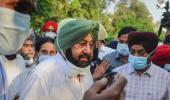A recent pre-election survey suggests that AAP may win 53 seats in the 117-member Punjab assembly and reduce the Congress to just 43.
Aditi Phadnis reports.

Of all the assembly elections due next year, the centre of attention is riveted on Uttar Pradesh. However, it is the Punjab assembly election that promises to reveal political and psephological trajectories not seen before in Indian politics.
What is new about the forthcoming election in a state that shares a border with Pakistan, has seen a separatist movement, and has among the highest concentration of Dalit population, but never a Dalit chief minister till recently?
The Punjab border with Pakistan is not considered a militarily 'hot' border, especially after it was fenced two decades ago. But the India-Pakistan relations have been a live issue in politics, especially the legacy left behind by Operation Blue Star.
In this election, an important political strand is going to be the way India engages with Pakistan and specifically the complexities of the Sikh identity and the Indian State.
Former CM Captain Amarinder Singh (retd) has already flagged this issue by alleging that his bête noire and the man who pushed him out of the position of the CM, Navjot Singh Sidhu, has deeper loyalties to Pakistan than to India.
"In the last election, the Aam Aadmi Party lost out because the leadership pushed too hard on the issue of the rights of Sikhs. This alienated the Hindus, who translated this as the AAP supporting Khalistanis and Pakistan," says psephologist Yashwant Deshmukh, founder-director, CVoter International.
In 2016, Punjabi non-resident Indians helped fund the AAP election campaign, and a section of these campaigners was said to be convinced that the AAP was sympathetic to the cause of the separatists.
This perception of the AAP among the Hindus prevented the party from forming the government in Punjab, but it did succeed in establishing the party as the leader of the Opposition.
This time around, the AAP is keeping its distance from NRI Sikhs. But the issue of the alleged desecration of the Sikh holy scriptures and the subsequent police firing will be a key electoral issue for it in the coming assembly elections.
Kunwar Vijay Pratap, who had headed the special investigation team that probed the Kotkapura and Behbal Kalan firing incidents, and who resigned from the Indian Police Service after the report was quashed by the Punjab and Haryana high court on April 9 this year, joined the AAP earlier this year. The party's national convenor and Delhi Chief Minister Arvind Kejriwal has also announced that the AAP's CM candidate will be a Sikh.
Politics around identity is going to be stretched thin. Now there are many more actors to lay claim to it. The last assembly election was fought by the Shiromani Akali Dal in alliance with the Bharatiya Janata Party. That alliance has since broken.
The BJP has announced it will contest all the 117 assembly seats on its own. The SAD has already found a new ally in the Bahujan Samaj Party. Captain Amarinder says he will float his own party and is open to an alliance with the BJP.
Traditionally, Punjab has seen elections where the major actors have been three parties. With the entry of the AAP, the last election saw four. This time around, there might be even more fighting for a slice of the political pie.
Rahul Verma, fellow at the Centre for Policy Research, visiting assistant professor at the department of political science, Ashoka University, and well-known for his expertise on India's domestic politics, says, "The political situation in Punjab has become quite fluid. On the face of it, it may seem like Punjab will have a five-cornered contest in the upcoming polls. However, in my opinion, it will remain by and large a triangular contest."
"The reasons for this are: First, even if Captain forms a new party and has some tactical understanding with the BJP or the SAD-BSP alliance, his influence will remain limited to the Patiala-Sangrur belt of East Malwa region.
Two, the BJP will remain a marginal player in the state, with only a segment of Hindus in the urban areas voting for it.
Three, the AAP's presence remains limited to the Malwa region of Punjab, which accounts for 69 of 117 seats. The party continues to struggle, expanding itself in Majha (25 seats) and Doaba (23 seats) regions of the state. Finally, the combined effect of the current crisis in the Punjab Congress, the inability of the SAD to remake its image over corruption scandals, and the AAP's desperation to expand its base has opened up the possibilities of multiple trajectories state politics can take, electorally and otherwise," says Verma.
Deshmukh, whose organisation, CVoter, has researched polling behaviour in India, agrees that this election in Punjab will be like no other before -- but for different reasons.
On the basis of a recent poll, Deshmukh's analysis is that the rift between Captain Amarinder and Navjot Singh Sidhu caused a major attrition in the Congress base. This will lead the AAP to become the biggest beneficiary.
The findings of a poll collated days earlier in October suggest the Congress, which got 38.5 per cent of the vote share in 2016, is down to 31.8 per cent, while AAP, which got 23.7 per cent of the vote share, is up a massive 35.9 per cent, an increase of around 12 per cent.
This pushes up the AAP tally of seats to 53, from the 20 it currently holds in the 117-member Punjab assembly, and reduces the Congress tally from 77 it held in 2016 (it won more seats in subsequent by-elections) to just 43.
Changes in the vote and seat share of the Akali Dal and BJP are small. While there is chatter that Punjab could see a hung assembly, Deshmukh rules this out, arguing if there is a hung assembly, it will only be "on paper".
Either way, the Punjab assembly election promises to throw up many surprises.










